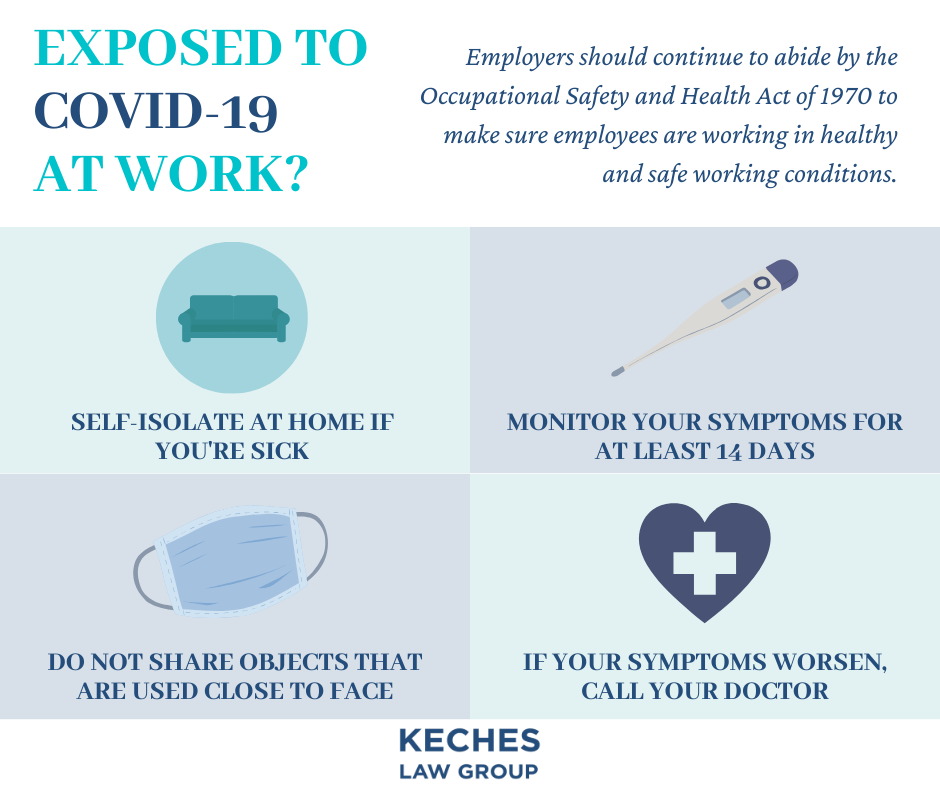

The number of coronavirus cases have grown each day. Keches Law Group would like to inform essential workers of what to do if they are exposed at work. Please see here to access the full list of who is considered to be an “essential worker.” Above all as an employer, you should be providing your employees with safety measures to work. Employers should continue to abide by the Occupational Safety and Health Act of 1970 to make sure employees are working in healthy and safe working conditions.
Providing Safe Measures to Work
Employers should develop an infectious disease preparedness and response plan (if they haven’t already). Here are some tips on how to practice good hygiene and infection control practices:
- Practice continuous and thorough hand washing.
- Encourage employees to remain home if they are sick.
- Employers should assess whether they can accommodate essential workers by looking into flexible worksites or work hours if they haven’t done so already.
- Make sure employees are using their own equipment and not sharing with other co-workers.
- Continue to maintain regular cleaning and disinfecting practices such as surfaces, equipment, and other elements within the workplace.
- Ensure that sick leave policies are flexible and consistent with public health guidelines. Make sure all employees are aware of these policies and can access them if need be.
I’ve been exposed to someone at work who is confirmed to have it and I have symptoms
If you are an essential worker and have been exposed and are having symptoms, it’s important to keep the following guidelines in mind.
- Stay home if you become sick.
- Continue to monitor your health for different symptoms like fever, cough, and shortness of breath (even mild symptoms) for at least 14 days after the last day you were exposed. You should not go to work and avoid public places for 14 days.
- Do not share headsets or other objects used close to face.
- If your symptoms worsen, call your primary care doctor ASAP.
The CDC recommends that anyone who has come in contact with an employee who is experiencing symptoms should be notified (starting with anyone who came in contact 2 days prior to symptoms).
I’ve been exposed to someone at work who is confirmed to have it, but I don’t have any symptoms
Any essential worker who has had exposure to coronavirus but does not show any symptoms should be extremely cautious by adhering to the following:
- Employers should take the employee’s temperature and assess for symptoms before the employee begins to work. This should take place before the worker enters the facility.
- If the employee doesn’t have any symptoms, he or she should still be cautious and self-monitor under the employer’s occupational health guidelines.
- Wear a mask within the workplace for 14 days at all times (starting on the last day of exposure).
- Practice social distancing by remaining 6 feet away from others always.
- Disinfect and clean all work areas routinely. This includes any bathrooms, offices, common areas, and any equipment that is shared amongst other co-workers.
- Per the CDC, essential workers may be able to continue work following potential exposure to coronavirus if they remain asymptomatic and are being extra precautionary to protect themselves as well as the community.
If any employee starts to experience symptoms, the employer should send the individual home immediately.
I’ve been diagnosed with it
- Inform your employer
- Stay at home and away from any public areas
- Monitor your symptoms and make sure to contact your doctor immediately if they worsen
- If you have any health appointments, make sure to call your healthcare provider ahead of time to inform them that they have COVID-19.
- Call 911 for any medical emergencies and make sure to notify the dispatcher that you have or may have the virus.
- Continue to practice good hygiene such as washing your hands, covering all coughs and sneezes, and cleansing all surfaces that are touched often.
- Try to stay in a specific room, away from other people in your home. Try to use a separate bathroom if possible. If you need to be near someone, make sure both you and the other person are wearing masks.
- Avoid sharing household items.



